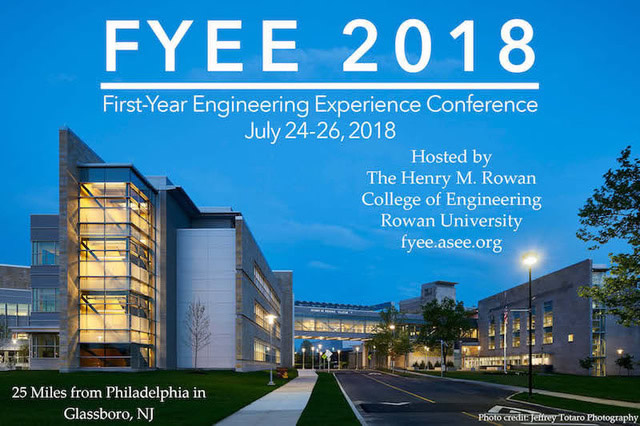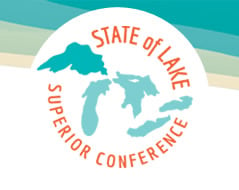 Gretchen Hein (EF) along with Ryan Knoll, chemical engineering undergraduate student, Nicholas Squires, Lake Linden-Hubbell High School science teacher, and Siona Beaudoin, Beau Hakala and Gabriel Poirier, Lake Linden-Hubbell High School students, presented their eCYBERMISSION project work at the State of Lake Superior Conference held at Michigan Tech October 9-12, 2018.
Gretchen Hein (EF) along with Ryan Knoll, chemical engineering undergraduate student, Nicholas Squires, Lake Linden-Hubbell High School science teacher, and Siona Beaudoin, Beau Hakala and Gabriel Poirier, Lake Linden-Hubbell High School students, presented their eCYBERMISSION project work at the State of Lake Superior Conference held at Michigan Tech October 9-12, 2018.
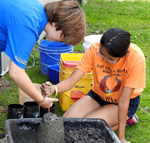 CALUMET — Members of the Whiz Kids and the Superior Remediators met Monday to complete the next step of their stamp sands experimentation, mixing cement with varying amounts of the gritty material left over from copper processing.
CALUMET — Members of the Whiz Kids and the Superior Remediators met Monday to complete the next step of their stamp sands experimentation, mixing cement with varying amounts of the gritty material left over from copper processing.
In June, the teams went to a competition in Washington, D.C. Afterward, they stayed a couple extra days, thanks to funding from the Lake Linden-Hubbell School Foundation, Lake Linden Lions Club and the American Legion Post 90 Auxiliary.
“The extra days were really important,” said Gretchen Hein, senior lecturer in the Department of Engineering Fundamentals at Michigan Technological University (MTU), who is advising the teams with help from MTU chemical engineering student Ryan Knoll.
Read more at the Mining Gazette, by Joshua Vissers.
A new use for Stamp Sand?
In recent months the Department of Natural Resources has made attempts at saving that fishing area from the drifting sand, but they have also asked for public input to offer solutions. Three kids have accepted that challenge and are currently testing their theories.
‘Their goal is to make concrete using stamp sand as part of the fine aggregate.’ Said, Gretchen Hein of Michigan Technological University.
Concrete is used worldwide for building just about anything and if the stamp sand can be used in the mix, there are plenty of things that can be made with it.
Read more at ABC 10 News, by Dane Wurmlinger.
Related:
Putting Stamp Sand to Good Use, and Then Some
Vote for the Whiz Kids tonight (Thurs. June 21) by 8:30 pm
Gretchen Hein Honored for Advising eCYBERMISSION National Winning Team
Mary Raber (Pavlis Honors College) and Mary Fraley (EF) presented: “Incorporating Design Thinking into the First-Year Engineering Curriculum” at the 125th Annual American Society for Engineering Education (ASEE) Conference in Salt Lake City, Utah, June 24 – 27, 2018.
Fraley, Raber and Gretchen Hein (EF) presented: “Work-in-Progress: Entrepreneurial Mindset in First-Year Engineering Courses” at the 10th Annual First Year Engineering Experience (FYEE) Conference at Rowan University in Glassboro, New Jersey, July 24-26 (FYEE 2018).
The work for both papers was supported by the VentureWell Faculty Grants Program, which funds projects to “pioneer new ways to engage students in STEM innovation and entrepreneurship.”
Related:
Jarvie-Eggart and Fiss present at FYEE 2018
Mary Fraley Among the 2018 VentureWell OPEN Conference Presenters
Michelle Jarvie-Eggart (EF) and Laura Fiss (Pavlis Honors College) are presenting the paper “Work-in-Progress: Comparing First Year Student Math and Verbal ACT Scores and Performance in Introductory Engineering and Composition Courses,” at the American Society of Engineering Education’s First Year Engineering Experience conference at Rowan University, New Jersey, July 24-26 (FYEE 2018).
The conference is hosted by the Henry M. Rowan College of Engineering at Rowan University in Glassboro. FYEE is an opportunity for academic and industry representatives to discuss and share relevant topics in the first year engineering experience. Participants include college deans, department chairs, student service professionals, advisors, faculty in engineering and engineering technology, K-12 teachers, and industry leaders from throughout the country.
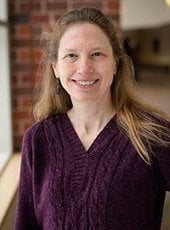
Norma Veurink (EF) is the principal investigator on a project that has received a $105,975 research and development grant from the University of Cincinnati.
The project is titled “Enhancing Middle School Mathematics Achievement Through Spatial Skills Instruction.”
This is the first year of a potential three-year project totaling $222,847.
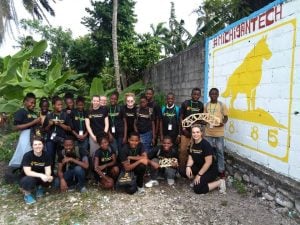
Over the fourth week of May 2018, Engineering World Health’s (EWH) team of Michigan Tech students participated in teaching the first high school class ever held at the HUT Outreach center in Les Cayes, Haiti. Haitian students were exposed to STEM (Science, Technology, Engineering and Math) topics like electronic circuits, forces, and bridges through hands-on learning lessons.
Students in Haiti often drop out of school in the sixth grade, with a diminishing retention rate thereafter. HUT Outreach is trying to break that statistic, and the Michigan Tech team got to be part of changing how these students viewed education.
In a typical Haitian class, the teacher delivers lessons by writing on a blackboard for hours while the students passively take notes. The first activity of their first day of STEM learning involved a health lesson on how germs were spread. The students were asked to stand up and run around the room as part of the learning exercise. They were notably reluctant to participate.
Using persistence and enthusiasm, the Michigan Tech team inspired the learners so much that students would arrive early to get a jumpstart on the fun lessons.
Michigan Tech team member Megan Byrne was recruited and trained as a peer mentor through the newly established first-year engineering LEarning with Academic Partners (LEAP) program. LEAP is implemented by the Department of Engineering Fundamentals, which provided support for the Haiti trip.
I would like to thank you so much for your generous donation to our Haiti trip. We were able to spoil the kids in our program, as well as tell them about why we love engineering and Michigan Tech. Many students told us they would like to be engineers one day, and one student even told us he would like to come to Michigan Tech. Your donation allowed us to bring a smile to so many faces, and inspire passion for education. Giving them MTU gear at the end of the week was an amazing way to wrap up our lessons and give them something to remember the past week by.
EWH inspires, educates and empowers young engineers, scientists and medical professionals from more developed parts of the world to use their engineering skills to improve global health. Michigan Tech is an EWH University Chapter, and Byrne is the vice president of the local chapter. LEAP Leader Megan Byrne had more to say about the experience:
Being a LEAP Leader helped me prepare for my trip to Haiti because I gained so much knowledge in preparing group learning lessons. Our EWH team wanted the students to learn the theory of series and parallel circuits, forces to build bridges, first aid, and how to build water filters. This was a challenge for us because the students had not been exposed to any of these topics or hands-on learning, and they also spoke a different language. Thanks to our Haitian translator, Wesley, and the experience I gained through the LEAP program at Michigan Tech, I had experience with taking a creative twist to difficult lessons to help the students gain understanding of some cool engineering topics in a way that would be impactful to them. As a matter of fact, the lessons we taught in Haiti were very similar to a LEAP sessions that I would facilitate in the Engineering Fundamentals department at Tech. I am grateful for the knowledge I have gained in not only my coursework, but also in facilitation of peer learning through the LEAP Leaders program. Because of my experiences here, I have had the great opportunity to share my education with those students who may have never had the opportunity, had we not been able to go to Haiti. If we even inspired one student to continue their education one day, the whole trip would be worth it. I believe that the key to solving many of the challenges in Haiti starts with education. It’s been incredible to be a small part in that.
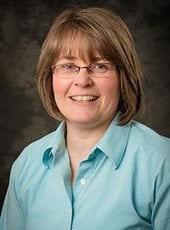
Mary Fraley, Engineering Fundamentals senior lecturer, Mary Raber, Pavlis Honors College assistant dean and Magann Dykema, University Innovation Fellow presented at the 2018 VentureWell OPEN Conference that took place in Austin, Texas, March 22-24.
OPEN gathers together representatives from across the innovation and entrepreneurship spectrum to share stories, start new collaborations, and learn emerging best practices in the rapidly evolving field of technology entrepreneurship education.
Fraley, Raber and Dykema presented on a modified first-year engineering curriculum that was piloted at Tech last fall. Based on the successful outcomes of the initial pilot, Michigan Tech was awarded a VentureWell Faculty Grant for the proposal “Building a Curriculum that Fosters an Innovation & Entrepreneurial (I&E) Mindset for our First-year Students.”
The Innovation Center for Entrepreneurship, Engineering Fundamentals, and the School of Business and Economics (SBE) have teamed up to incorporate design thinking methodology into a combined first-year engineering and business course.
More about how the new grant will be used to expand upon the fall pilot can be found here.
By Pavlis Honors College.
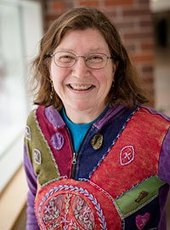
Gretchen Hein (EF), was honored at the National Science Teachers Association National Conference for her advising of the 2017 eigth-grade eCYBERMISSION National Winning Team. eCYBERMISSION is a “is a web-based science, technology, engineering, and mathematics (STEM) competition for students in grades six through nine that promotes self-discovery and enables all students to recognize the real-life applications of STEM” according to their website. The Lake Linden-Hubbell High School team was comprised of Siona Beaudoin, Beau Hakala and Gabriel Poirier, along with guidance from Ryan Knoll, a student in Chemical Engineering. Hein is advising the ninth-grade eCYBERMISSION team and they have submitted their mission folder for review and evaluation.
Mission folder judging is based mainly on application of scientific inquiry using scientific practices or engineering design process. Other criteria include benefit to the community and team collaboration. First-place national award winners receive a $5,000 U.S. Series EE Savings Bond at maturity per student.
eCYBERMISSION Mission Folder for “Whiz Kids”
Extract from Community Benefit:
Stamp sand is an abundant material in our community. Due to the mining that took place in our community there are some areas of stamp sand along Lake Superior and on Torch Lake near our town. Though the Environmental Protection Agency has remediated some areas by spreading topsoil over the stamp sands and planting plants, there are some areas still with exposed stamp sand.
When learning about stamp sands and where they are located, we took a trip to the stamp sands in the town of Gay Michigan. We looked at the vegetation that was growing on the stamp sand. This relates to our experiment because we are trying to test which type of plant will grow in the least amount of topsoil. On this trip, we saw where plants were already growing in the sands, but we also noticed that there were a lot of barren areas. The regions where plants grew where water pooled or flowed into the area bringing not only water, but nutrients too.
Our school participates in the Lake Superior Stewardship Initiative (LSSI). This program “brings together schools and community partners to prepare K-12 students to become knowledgeable citizens concerned about the Lake Superior watershed and actively engaged in stewardship projects in their community.” (LSSI) Students in different science classes at our school sample water and soil as part of the Torch Lake Remediation Monitoring program.
Read more about the Whiz Kids’ scientific inquiry at eCYBERMISSION.
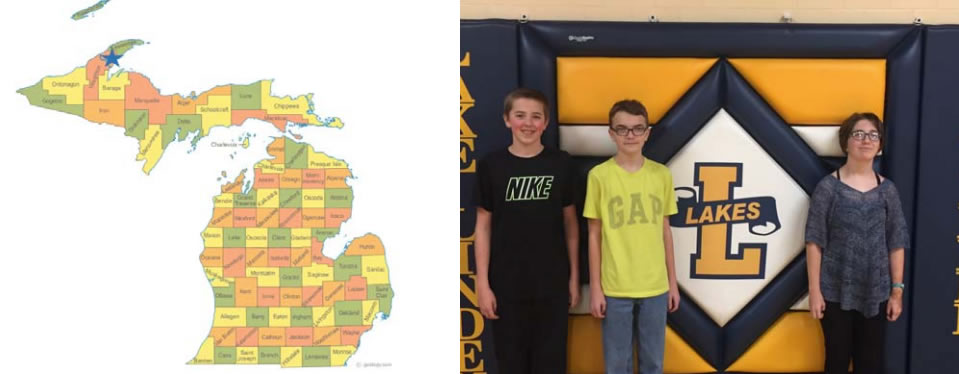
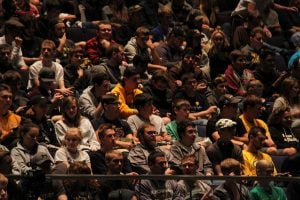
Mary Raber (Pavlis Honors College/LIFT) is the principal investigator on a project that has received a $22,800 instruction grant from VentureWell.
Mary Fraley (EF), Brett Hamlin (EF), Amber Kemppainen (EF) and Jonathan Leinonen (SBE) are Co-PIs on the project, “Building a Curriculum that Fosters an Innovation and Entrepreneurial Mindset for Our First-Year Students.” This is the first year of a 2.6-year project.
By Sponsored Programs.
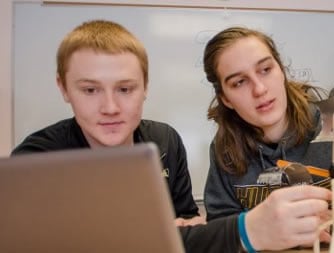 The Fall 2017 semester at Michigan Tech brought something new to first year engineering students taking courses ENG 1001 and ENG 1101: Inclusive Access. The result—a tremendous cost savings.
The Fall 2017 semester at Michigan Tech brought something new to first year engineering students taking courses ENG 1001 and ENG 1101: Inclusive Access. The result—a tremendous cost savings.
In an effort to offset the rising costs of course materials, Michigan Tech’s Campus Store—together with a text book publisher, an e-book vendor, and Department of Engineering Fundamentals faculty—provided students course material access (in the form of an e-book) through Canvas for the first day of classes. Students were emailed prior to the semester to explain the process. They could choose to opt-out of the Inclusive Access program within the first 10 days of the semester and seek alternatives on their own. If they didn’t opt-out or drop the course, their tuition accounts were charged.
The cost savings for 896 Engineering Fundamental students exceeded $72,000. Course materials that formerly cost students $230 as physical books only cost them $149 digitally through the Inclusive Access program. The same course material is used throughout the First Year Engineering Program sequence, and students can access the material for two years.
Research indicates students who have access to course materials have a higher success rate in the classroom than those that choose not to use them. The Campus Store is looking to expand the Inclusive Access program to help increase the chances of student success.

